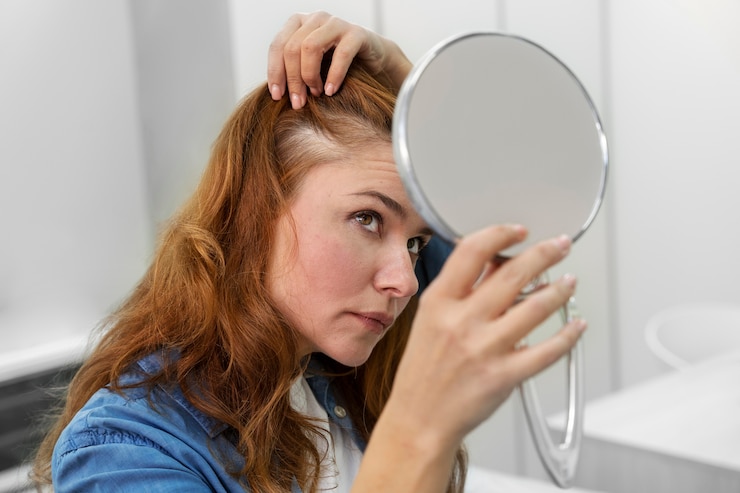
Your hair is often seen as your crowning glory, and there’s good reason for that. Healthy, shiny hair can make you feel more confident and can reflect a lot about your personality. Being able to style your hair exactly how you like can even give you a sense of freedom. But when hair starts to thin, it can be unsettling and knock down that confidence.
Noticing more hair than usual in the shower drain or on your brush? While it’s normal to shed anywhere from 50 to 100 strands a day, if you feel like you’re losing more than that, there could be several reasons why. Here are five common causes of hair thinning:
1. Overprocessing Your Hair
Sometimes we try so hard to care for our hair that we end up doing more harm than good. Treatments like perming, coloring, bleaching, or straightening can weaken the scalp and lead to hair thinning. Similarly, using styling products with harsh chemicals like parabens, synthetic fragrances, and formaldehyde can damage your hair over time.
Switching to organic hair care products might be a good idea, as they’re often made with natural ingredients that keep both your hair and scalp healthy. To prevent further damage, consider using a hair loss prevention shampoo designed to counter thinning caused by excessive chemical exposure.
2. Genetics
Hair thinning caused by genetics is the most common type of hair loss, known as hereditary-pattern baldness. This condition is influenced by a mix of genetics, aging, and hormone levels. For men, it can start in their 20s or 30s. For women, it’s more common after menopause.
Unfortunately, there’s no permanent cure for hereditary-pattern baldness, but there are treatments that may help slow its progression.
3. Postpartum Hair Loss
If you’re a new mom, you might notice extra hair shedding after childbirth. This is common and temporary, often resolving by the time your baby turns one. To manage postpartum hair loss, dermatologists suggest using volumizing shampoos and avoiding heavy conditioners that can weigh hair down. Also, a shorter haircut might make your hair look fuller and healthier.
4. Vitamin and Mineral Deficiency
Lack of certain nutrients, such as iron and folic acid, can lead to hair thinning. Iron is important for producing hemoglobin, which ensures your hair follicles get the oxygen and nutrients they need to grow strong. A deficiency in folic acid, which supports healthy cell growth, can also negatively impact your hair, skin, and nails. Additionally, low levels of vitamins D and E or zinc can contribute to thinning hair.
If this is the reason for your hair loss, the solution is straightforward. Your dermatologist can recommend supplements to address deficiencies, and maintaining a balanced diet can help prevent the problem from recurring.
5. Chronic Stress
Persistent stress can push hair follicles into a resting phase, causing strands to fall out more easily when combing or washing your hair. In some cases, severe stress might trigger alopecia areata, an immune response that causes patches of hair loss.
The good news? Stress-related hair loss is usually manageable. Taking steps to reduce stress, slowing down, and practicing relaxation techniques can go a long way in improving your overall well-being and allowing your hair to recover.
In Summary
Full, healthy hair can have a big impact on your confidence, while thinning hair can make you feel self-conscious or even anxious. If the cause of your hair loss is something you can control, it’s important to act quickly to prevent further thinning. Don’t hesitate to consult a medical professional if necessary—taking action early can help you restore the confidence that healthy, voluminous hair can bring.